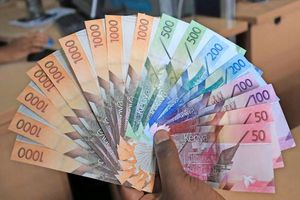
Data from the CRBs reveal that 7.65 million of 29.72 million accounts were in default by the end of December, up from 3.89 million in March 2023.
Many citizens think of them as credit bureaus, where defaulters are unhappily listed. Banks and other financial institutions often use them as a cog in collecting overdue loans.
When you are late with your credit card payment, you will likely receive a not so friendly email or phone call from a bank staffer threatening you with a bureau listing if you don’t pay up promptly.
Politicians wrongly think of bureaus as a barrier to credit. They are all wrong. Here is why. Credit scoring and credit rating are established methods of estimating the probability of default of a borrower. If a customer has defaulted thrice out of the last hundred instances when she obtained credit, then you can conclude that the probability that she will default on your current lending to her is three percent.
Scoring is typically for individuals and micro business. Rating is better for corporates, counties and the nation. Referred to as sovereign ratings, the latter has been a sore point for the KK regime.
Kenya’s ratings were downgraded recently, making it more expensive for the government to borrow. Scoring and rating are conducted under license. Credit bureaus are licensed by the Central Bank.
Credit Rating Agencies are licensed by the Capital Markets Authority. Both scoring and rating are routinely misunderstood. Two years ago, credit bureaus and the credit information sharing mechanism they provide, came under intense pressure from the KK regime. The misplaced perception that credit bureaus are a blacklist was at the heart of the bureau bashing.
The regime wanted all defaults on micro loans removed from the bureau data. The perception was misplaced.
Bureaus carry full file data. That is data about both when you are paying and when you are not. The individual’s credit score is a composite derived from all your activity. Obviously, instances of default weigh down your score, while regular payment improves it. Allowing bureaus to use more of your data – such as water and electricity payments, rentals and hire purchase, improves your score even further.
The KK regime’s political discourse was also counter to the Central Bank’s risk-based supervision of the banking sector. Credit scoring and rating enable calculation of the probability of default, a key step in pricing risk.
Combining it with loss given default, the banks can accurately estimate expected loss, thereby price it. Expected loss is an example of mathematical expectation, an idea elusive to most us.
One way to think about it, is to reflect on Pascal’s wager. Proposed by 17th century mathematician, Blaise Pascal, it made him both famous and to believe in God. To get a sense of the wager, consider this.
Suppose you and your pals are taking bets on the mashemeji derby between Gor Mahia and AFC Leopards. You bet that AFC will win. Half way through the second half, the unusually heavy rains (thank God for them, inflation is down), forces the teams to abandon the match, with Gor leading two to one.
How would you share the pot? Historically, this scenario was called the problem of points. In solving it, the clever Pascal figured out that the expected value of a random variable with a finite number of outcomes is a weighted average of all possible outcomes. Too much religion and math for your Saturday morning coffee, you say.
But even if you are a gambling non-believer, you certainly can accept that there is a fifty per cent chance that God exists, after all it is either he does or does not. The payoff for believing he does is infinity of happiness in heaven.
Even at a fifty per cent chance, half of infinity is still infinity, while the cost to you is the small matter of living a godly life and denying yourself earthily pleasures for a few short years - a rather small price to pay for an infinity of happiness.
Every rational person should, therefore, believe in God, Pascal concluded. Being rational beings, practitioners, regulators and policy makers involved in credit information sharing met in Johannesburg this week, to take stock of the sector across the Continent. I was pleased to be among them. Before political leadership, creating credit bureaus, and improving the functioning of bond markets were part of my daily job.
Later, I would use these same skills to arrange affordable credit for businesses in Laikipia, and put together the first county infrastructure bond ever. We have a come a long way, the last two decades years.
At the beginning, Kenyan banks were very nervous about credit information sharing. They thought it might lead to loss of competitive information, and of their good customers.
As a result, a compromise was reached to start by sharing only data on defaults.
Unfortunately, this led to the misplaced perception by both the banks and politicians that bureaus were a blacklist. Reflecting on the current situation, the volume and quality of data has vastly improved.
Twenty years ago, the effort to build the first credit scoring card for small businesses took nearly two years.
We had to involve 43 banks from Kenya, Uganda and Tanzania. Even then, we could only find 2,200 files where the original application conditions could be matched with the credit outcome!
Still, it was a reasonable sample to test which verifiable application conditions were predictive of credit outcomes.
Today, bureaus handle billions of records. Credit information sharing is taking place in all East African Countries.
In neighboring Ethiopia, the mechanism is operated by the Central Bank. Credit Rating Agencies operate across the region. Still, there is work to be done.
Governments are not using the rating agencies they are licensing, preferring instead ratings from the big three amidst regular complaint. Scoring and rating are very serious math and science.
Properly used, they vastly improve access to finance, enable risk-based pricing of loans and better supervision of banks. And, as happened to Pascal, reinforce your faith!







